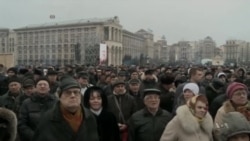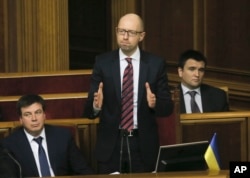Violence in eastern Ukraine is on the rise again after relative calm during the winter. Recent reports from the contested Donbas region say the death tolls since mid-February are similar to those in September of last year, before a shaky truce took hold. Pro-Russian separatists in eastern Ukraine have been fighting government forces since the ouster of President Viktor Yanukovych two years ago. The unrest also has returned to the capital, Kyiv, where protesters demand the resignation of Prime Minister Arseniy Yatsenyuk.
Ukrainians are marking the second anniversary of mass protests in Kyiv that led to the ouster of President Yanukovych and Russia's involvement in the former Soviet republic. During the main event on Sunday, flowers were laid in Maidan Square to honor the protesters killed there two years ago.
“I came here to mark the anniversary of two years since people were killed, but found another revolution starting,” said activist Oleksandr Voevudskiy.
The tents erected by activists were still up Monday, with demonstrators expressing discontent with the current government.
"We have three requests: the resignation of Yatsenyuk's government that didn't do its job and also an investigation into the killings of Maidan activists and other important cases, and no political judgment for activists," said Aleksander Misura, a protester in Kyiv.
On Saturday, protests turned violent as nationalists vandalized Russian banks in Kyiv and other cities to express anger at Moscow for annexing the Crimean peninsula in March 2014 and providing military support for separatists in eastern Ukraine.
German and French foreign ministers arrived in Kyiv Monday to urge Ukrainian leaders to step up reforms needed for the implementation of a permanent peace agreement. The reforms negotiated last year in Minsk have been delayed by political squabbling in Kyiv. And Yatsenyuk's government barely survived a no-confidence vote earlier this month.
EU officials stressed the importance of stability for Ukraine's future.
"I know that you are very much committed to this course of internal reforms and I'm sure you know, we know, and regarding the last comments of the International Monetary Fund which are saying: 'in principle we can be supportive if there is stability - political stability in Ukraine,'" said German foreign minister Frank-Walter Steinmeier.
Ukraine's economy has stalled amid political unrest and violence in the east. Kyiv also bears the burden of refugees who fled Crimea and rebel-held regions in the east.






